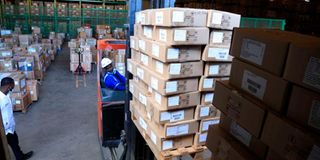Kemsa dispatches HIV drugs to 31 counties

Kemsa staff packing HIV drugs before being dispatched to various counties at Kemsa warehouse in Embakasi, Nairobi, on April 22, 2021.
The Kenya Medical Supplies Authority has dispatched HIV drugs worth Sh1.2 billion to 31 counties. Kemsa Customer Service Manager Geoffrey Mwagwi said that the remaining 16 counties will receive their stock by Monday.
Children living with HIV will, however, continue to wait for their doses of regimen Nevirapine (NVP) syrup since the drug is yet to arrive in the country. Mr Mwagwi said that the drugs are expected in the country in a weeks’ time.
In a statement, Kemsa’s acting chief executive, Edward Njoroge said that there is enough stock of HIV drugs.
“We will continue to replenish and distribute to the mapped sites as need arises. Some counties have already received the consignment from Kemsa and I believe this will relieve some pressure from patients,” he said.
Speaking on the possible end to the ongoing row, Mr Douglas Onyancha, USAid’s representative on the Kemsa board has said that Tenofovir, Lamivudine Dolutegravir (TLD) will soon be cleared from Mombasa port where they have been stuck since January 18.
“The standoff on the acquisition of HIV drugs has been resolved, we could be receiving the drugs anytime,” said Mr Onyancha.
This will come as a relief to the close to 1.4 million HIV patients. The drugs dispatched to the counties on Thursday were part of an old stock that had been donated by the President’s Emergency Plan for Aids Relief (Pepfar) and the Global Fund.
“We are waiting for another consignment in a week’s time. Our duty is only to receive what has already been procured by the Ministry of Health and the National AIDS and STIs Control Programme (Nascop).
Mr James Kamau, a member of a civil society called Kenya Treatment Access Movement said that the government needs to find a solution to end the shortage of ARVs.
“We are tired of shortages which are caused by unnecessary a bureaucracy. We should create sustainable finance fund for ARVs and stop depending on donor funds,” Mr Kamau said.
“We have the capacity to produce our own drugs, I understand the Universal Pharmaceutical Company is in the process of getting authorisation to produce ARV drugs locally from the World Health Organisation, that will be a good start,” he added.





